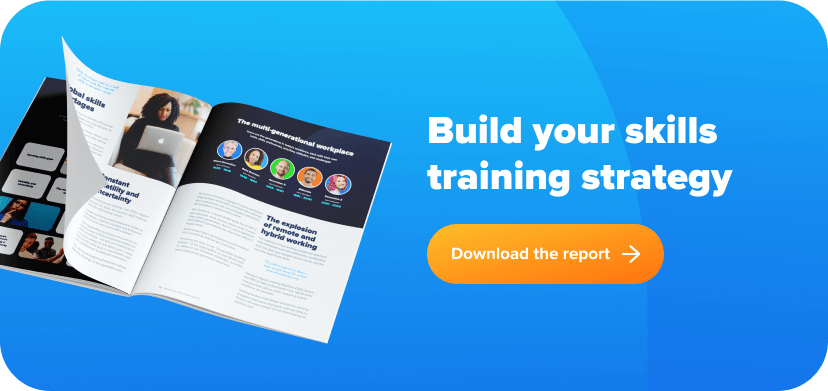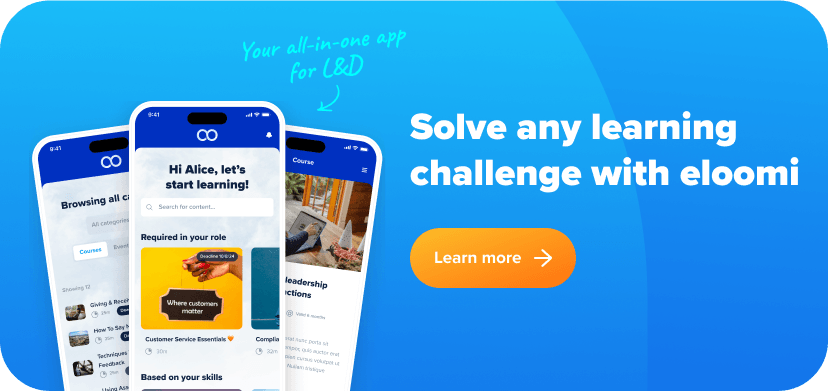What are power skills?
Power skills are the core capabilities that enable employees to succeed in their roles, though they also extend beyond the world of work. Capabilities like having an analytical mindset, adapting to change, or being a great communicator are all powerful skills for daily life, so it’s worth exploring how we can harness these abilities – especially if you’re an L&D expert considering the best skills for employees to train and develop.
Power skills incorporate both hard and soft skills, referring to concrete abilities like managing excel spreadsheets, as well as traditionally ‘softer’ skills like leading meetings or giving constructive feedback. By definition, power skills are critical abilities that enable us to succeed and advance at work.
Power skills examples
Here are some examples of power skills and how they enable employees to enhance their performance at work.
- Creative thinking: The ability to find innovative solutions and approaches to solve complex problems.
- Social Influence: The power of persuasion and effective communication to drive positive outcomes.
- Digital Intelligence: The understanding and utilisation of digital tools and technologies for success.
- Adaptability: The ability to navigate change and thrive in dynamic environments.
- Analytical Judgement: The ability to critically analyse information and make data-led decisions.

5 power skills to empower people development
In this section, we’ll unpack our top 5 power skills to enable employee development and how these skills can be trained and developed for success.
1. Creative thinking – a transformative skill
The power of creative thinking goes beyond problem-solving. By refining our critical and creative thinking abilities, we are able to thoroughly scrutinize information, question assumptions, and make well-informed decisions.
As L&D professionals we know that creative thinking and problem solving are essential. The ability to think critically enables us to adapt, evolve, and thrive in any environment. Whether it’s in the workplace, the classroom, or everyday life, creative thinking supports us to overcome challenges, seize opportunities, and reach our full potential. So, creative thinking is a clear example of a power skill. But how do you train creative and critical thinking?
Learning courses can give employees access to training, tools, and new approaches to practice critical thinking, or tapping into a creative mindset. While we often think of creativity as something that’s hard to grasp, it’s possible to break it down into tangible approaches and outcomes – which is why it’s worth exploring courses on creative thinking today.
2. Social influence – building your connections
Don’t worry; we’re not about to give you tips and tricks on how to become the next LinkedIn-fluenza (pun intended). It’s more than that. The power of human connection shapes our interactions and drives change in our communities. At work, social influence can help you motivate others, foster teamwork, and drive performance. By building trust, demonstrating empathy, and communicating effectively, you can inspire your team to achieve shared goals and overcome challenges together.
At its core, the power skill of social influence is about more than just persuasion; it’s about building meaningful connections, inspiring others, and driving collective action. Whether you’re leading a team, collaborating on a project, or engaging with your community, the ability to influence others is essential for success.
For example, courses in social influence are crucial for management and leadership skills training because they can teach us how to be better at communicating, listening, and leading teams. Knowing how to manage projects is one thing, but knowing how to manage people is the power skill that will see you truly succeed.

3. Digital intelligence – leveraging new technology
Digital intelligence encompasses a range of skills, from basic digital literacy to advanced data analysis and strategic digital thinking. It’s about being able to navigate the digital landscape with confidence and use technology effectively to achieve business goals and solve problems.
In simpler terms, digital intelligence enables employees to adapt to new technologies, leverage digital tools for productivity and collaboration, and stay safe and secure online. In a world where technology is constantly evolving (not to mention the rise of artificial intelligence) having strong digital intelligence is essential for staying competitive and relevant in the workplace.
The benefits of digital intelligence extend beyond the individual level. For organizations, having a digitally intelligent workforce is a strategic advantage that drives innovation, efficiency, and growth. Imagine a company where every employee is fluent in digital technology and able to harness the power of data analytics and automation to drive business results.
4. Adaptability – responding fast to change
Adapting to change is the secret to thriving in the midst of uncertainty. Adaptability is a critical skill for employees to navigate, whether it’s learning to work remotely, or adjusting to the use of AI in the workplace. Adaptability allows us to guide and support individuals to thrive confidently in the midst of change.
So, how can we embrace adaptability in the workplace? It starts with a simple step: shift your mindset. Instead of fearing change, welcome it with open arms. See every challenge as a chance to grow, every setback as a stepping stone to success.
Of course, mindset is the first challenge. Dedicated courses on adaptability and resilience can help employees learn how to adjust to change, understand how organizational decisions are made, and develop the resilience to overcome any challenge. Above all, it’s important to keep learning, keep growing, and keep evolving with every step you take.
5. Analytical judgement – better decision making
Analytical judgement is a power skill that’s not just about crunching numbers but about unlocking insights, making informed decisions, and driving innovation.
Imagine you’re faced with a mountain of data – sales figures, customer feedback, market trends – and you need to make sense of it all to drive your business forward. That’s where analytical judgement comes in. It’s the ability to sift through information, identify patterns, and draw meaningful conclusions that support strategic decision-making.
So how can analytical judgement be learned? With dedicated training in analytical judgement, it’s possible to go beyond data analysis and engage critical thinking skills, problem-solving for teams, and strong creative reasoning. It’s about seeing the big picture, connecting the dots, and envisioning possibilities that others might overlook.
Next, provide practical tools and resources that empower employees to apply analytical judgement in their daily work. Whether it’s data analysis software, decision-making frameworks, or case studies that illustrate real-world applications, give your team the tools they need to succeed.

The importance of power skills for people development
Ultimately, the top five power skills: creative thinking, analytical judgment, adaptability, digital intelligence, and social influence, are essential for fostering people development and creating a culture of continuous learning.
Creative thinking equips us to navigate rapid changes by challenging assumptions and enhancing decision-making. Analytical judgment transforms data into actionable insights, driving innovation and ensuring informed decisions. Adaptability empowers us to embrace new experiences and turn challenges into opportunities, maintaining resilience. Digital intelligence is indispensable in leveraging technology for problem-solving and staying competitive. Lastly, social influence fosters meaningful connections and teamwork, driving positive change and enhancing performance.
By cultivating these skills, individuals and teams can thrive, adapt, and lead effectively in any environment. Get in touch to access dedicated courses on these power skills, or explore learning content to support learning and development in your organization.






